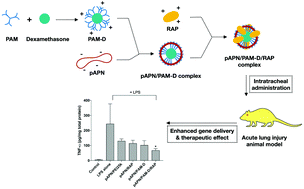A RAGE-antagonist peptide potentiates polymeric micelle-mediated intracellular delivery of plasmid DNA for acute lung injury gene therapy†
Abstract
Acute lung injury (ALI) is a severe inflammatory lung disease. A high mobility group box-1 (HMGB-1) derived RAGE-antagonist peptide (RAP) was previously developed for anti-inflammatory therapy for ALI. Due to its specific binding to RAGE on the surface of inflammatory cells, the RAP may facilitate polymer-mediated intracellular delivery of plasmid DNA (pDNA) into the inflammatory cells. To evaluate this hypothesis, a pDNA/polymer/RAP ternary-complex was produced and applied for ALI gene therapy. Dexamethasone-conjugated polyamidoamine G2 (PAM-D) was used as a gene carrier, and the adiponectin (APN) gene was employed as a therapeutic gene. First, the ratio of pDNA to PAM-D was optimized in terms of anti-inflammation and low toxicity. Then, the RAP was added to the pDNA/PAM-D complex, producing the pDNA/PAM-D/RAP complex. The transfection efficiency of the luciferase plasmid (pLuc)/PAM-D/RAP reached its maximum at a weight ratio of 1 : 2 : 9. At this weight ratio, pLuc/PAM-D/RAP had a higher transfection efficiency than pLuc/PAM-D or pLuc/RAP. The transfection efficiency of pLuc/PAM-D/RAP decreased due to competition with free RAPs, suggesting the RAGE-mediated endocytosis of the complex. In the LPS-activated ALI mouse models, intratracheal administration of APN plasmid (pAPN)/PAM-D/RAP induced higher APN expression and less pro-inflammatory cytokines in the lungs of ALI animal models than pAPN/PEI25k, pAPN/RAP, and pAPN/PAM-D. Hematoxylin and eosin staining confirmed the higher anti-inflammatory effect of pAPN/PAM-D/RAP than the other complexes in the ALI models. Therefore, RAP-mediated enhanced delivery of pAPN/PAM-D may be useful for the development of a treatment for ALI.



 Please wait while we load your content...
Please wait while we load your content...